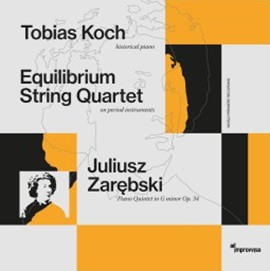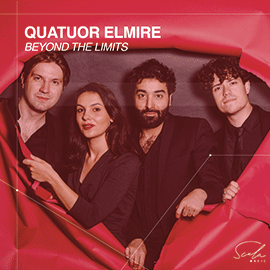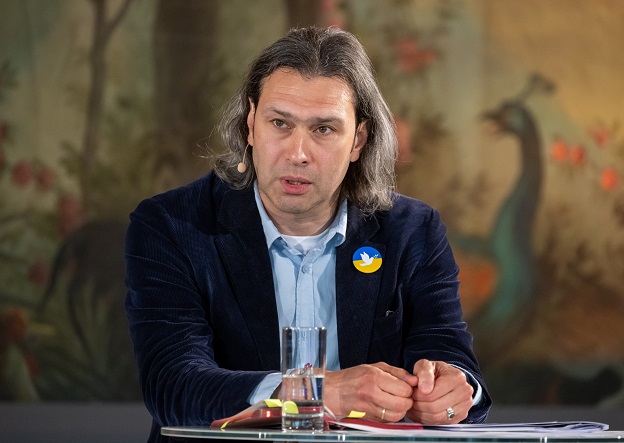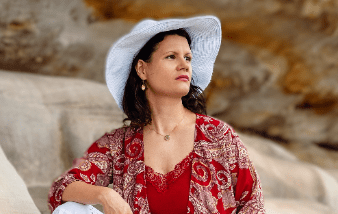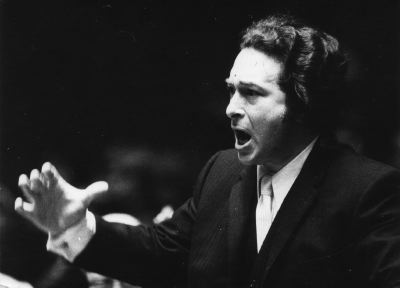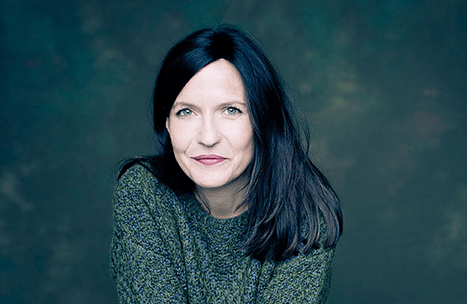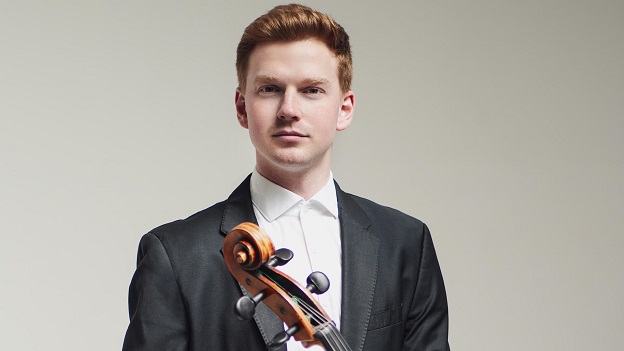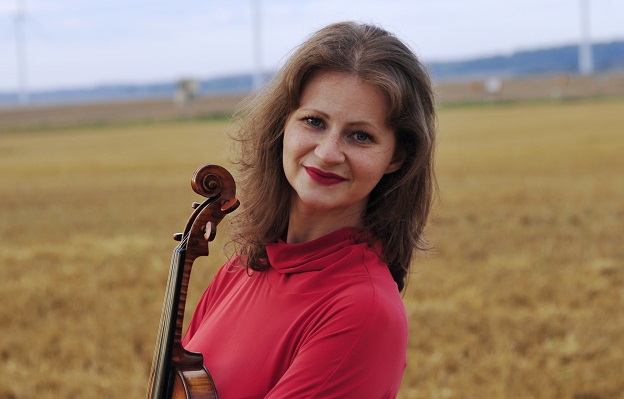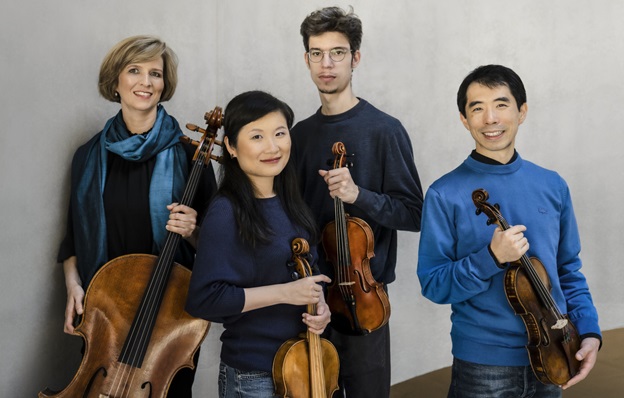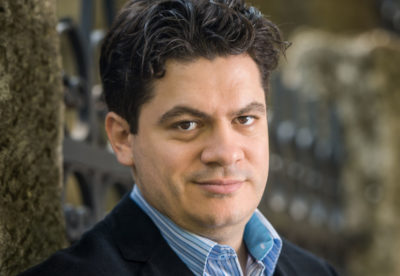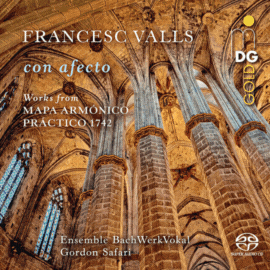Haben Sie sich über die ICMA-Auszeichnung gefreut?
Es hat mich schon sehr erstaunt, weil es gab ja nicht nur positive Kritiken für diese Produktion. Es gab auch Schelte, auch in Richtung Musik. Gerade die Münchner Kritiker schienen sich überhaupt nicht an der Art und Weise zu begeistern, wie ich Johann Strauss Musik versucht habe zu deuten. Ich habe manchmal das Gefühl, sie schweben in Erinnerungen an die längst vergangenen Zeiten, ohne tatsächlich noch zu wissen, wie das nun wirklich war. Read More →
Viktoria Elisabeth Kaunzner, mit Ihrem neuen Album sprengen Sie musikalische Grenzen. Es ist ein Album, das östliche und westliche Traditionen verschmilzt und klassische Konzertrituale hinterfragt. Ihr 30-köpfiges multinationales Ensemble UKOREVV wird dabei zum Labor für eine neue, grenzüberschreitende Musiksprache. Sie suchen offenbar auch jenseits der Musik nach Inspiration. Gerade waren Sie intensiv auf der Berlinale unterwegs?
Ja, ich habe die Gunst der Stunde beim Schopf gepackt und war in sieben Filmen in vier Tagen. Das Niveau hat mich überrascht – Filme aus Korea, Taiwan, Kanada und eine deutsch-französische Produktion. Read More →
Bruckner’s 9th under Païta is one of the fastest, most dramatic and eccentric on the market. What led the conductor to immerse himself in this music?
AH: It’s true. I was able to see this by consulting my rather extensive collection of interpretations of this work, and I realized the obvious. This rapidity – but I don’t like this word, which means nothing other than what the score in principle demands and which remains formal – deserves rather the qualifier of urgency. On the one hand, there is something hasty, even a decision, that of a confrontation with death, for example, which haunts this work far more than joy. In fact, there is no joy here, which is strange for a confession of faith, since the work is dedicated to « To the good God »)… Read More →
You became the winner of the ICMA Discovery Award for the year 2025, one of the most prestigious awards in the classical music world. How did this award make you feel?
First of all, I felt incredibly happy and privileged to be chosen among many talented young artists by so many esteemed professionals in the classical music world. I am very proud to be a part of the ICMA family whose members include the best classical musicians. It is also a great responsibility but I believe this exciting responsibility will be a driving force for future achievements. Read More →
Aus der Stille: ein interessanter Titel für eine CD. Denn Musik hat zumindest akustisch eher wenig mit Stille zu tun. Aus welchem Grund haben Sie diesen CD-Titel gewählt?
(lacht) Nun… Musik kommt aus der Stille und geht in die Stille. Stille ist nicht nur Abwesenheit von Klang, sondern ein aktives Element, das die Struktur, die Ästhetik und Emotion der Musik beeinflussen kann. Stille erzeugt Spannungsmomente, die beim Publikum ein Gefühl der Erwartung erzeugen kann. Read More →
Benjamin Kruithof, you were born into a musical family and started playing the cello at the Conservatoire du Nord (Luxembourg) at around the age of five. How did you become interested in the cello?
It’s actually not such a spectacular story. A very good friend of the family, Raju Vidali, played tennis with my father once a week. I thought he was super cool. He plays the cello and is a professor at the Conservatoire. That was a big motivation. Furthermore, it was also very important for my parents, that I learn an instrument. Not with the goal of pursuing it professionally, but simply as part of a general education. And somehow, it has now become a profession. Read More →
Dear Mitra, even apart from the thematic focus, the program of this album is literally remarkable.
Yes, I present a century of music history in which female composers and their masterful works are highlighted. With its diversity, this program opens up a new musical world for the audience. Read More →
Frau Migdal, Ihr neues Album beinhaltet eine ungewöhnliche Kombination von Musik des Komponisten Paul Ben-Haim. Da trifft das Stück Yizkor, das man schon fast als Violinkonzert bezeichnen könnte, auf Kammermusik und diese trifft auf Lieder für Mezzosopran und Klavier und dann wird das alles noch verbunden durch Lieder ohne Worte in verschiedenen Besetzungen. Wie kam es zu dieser ungewöhnlichen Gemenge-Lage?
Yizkor, was mit ‘in Gedenken’ übersetzt werden kann, aus dem Jahr 1942, ist sicherlich neben den Three Songs Without Words Ausgangspunkt dieses großen Projektes gewesen. Die Musik von Paul Ben-Haim hat mich beim ersten Hören bis ins Mark getroffen – das war 2008. Seitdem spiele ich seine Werke, wann immer es möglich ist. Read More →
Wie kam es zur aktuellen CD-Produktion und dem besonderen thematischen Fokus auf Streichquartette von Opernkomponisten?
Wir wollten unbedingt Verdis Streichquartett aufnehmen. Es wird eher selten gespielt, ist aber ein ganz besonderes Werk. Parallel dazu hatten wir schon lange vor, Mozart aufzunehmen. In seiner Kammermusik erleben wir ihn wirklich als großen Opernkomponisten – in jedem Satz spürt man die szenische Darstellung. Read More →
What does this award mean to you and how do you feel about receiving it?
I am, above all, very happy for the opportunity to produce this album with Enescu’s music. This is music I have loved all my life and I have always wanted to bring it into a brighter spotlight by recording the three symphonies and the two rhapsodies. These recordings are just the beginning, so to speak, of my broader vision for showcasing Enescu’s music. I am delighted that these efforts continue to garner such attention. For me, this award is a recognition of not just our hard work, but also the incredible quality of Enescu’s compositions, which fills me with great joy. Read More →




